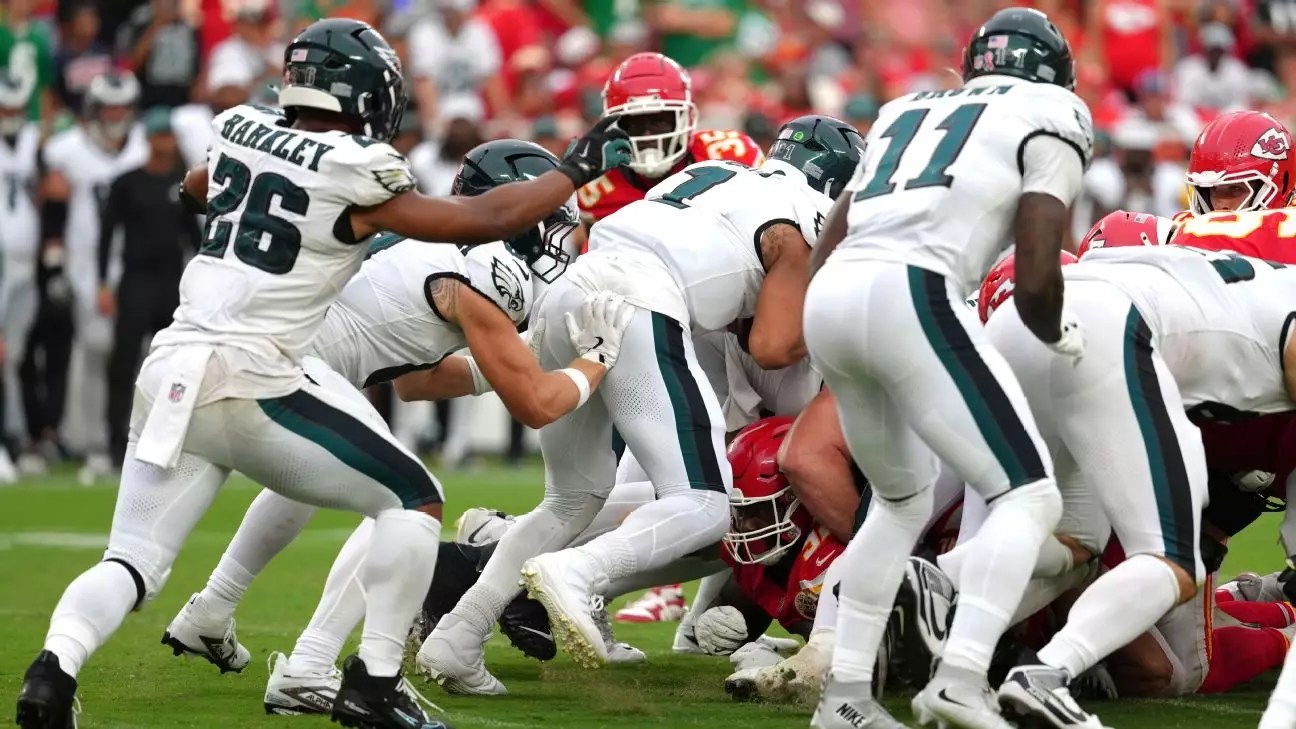In the heart of the NFL’s grand spectacle lies an often overlooked reality: officiating bias subtly favors the powerhouses of the league. The recent controversy surrounding the Philadelphia Eagles’ famous “tush push” underscores a broader issue—are officials genuinely neutral, or do they, perhaps unintentionally, allow certain teams to exploit the rules more freely? An in-depth look reveals that the NFL’s insistence on strict enforcement in short-yardage plays is just a surface-level attempt at fairness, masking underlying preferences that benefit the league’s most influential teams.
The league’s public statements—calling for tighter officiating on the Eagles’ plays—feel more like reactions to public outcry than genuine efforts to uphold fairness. When the NFL instructs officials to monitor the Eagles’ alleged missteps minutely, it underscores a troubling double standard. Teams with a history of success, like the Eagles and their mastery of the tush push, seem to operate in a semi-legal gray area, flaunting unspoken rules that the league hesitates to enforce consistently. Is this meticulous policing a sincere attempt at justice, or a way to contain scrutiny on teams that push the boundaries but are still favored by the league?
The Power of Standardization and the Danger of Bias
The NFL’s recent emphasis on strict officiating during short-yardage plays exposes a fundamental dilemma—the intent to create a level playing field collides with inherent biases embedded within the game’s structure. When the league’s vice president of officiating training states that plays in these situations should be officiated “tight,” it conveniently shifts the burden onto officials to punish teams that dare to challenge the system. Yet, this “tight” enforcement often results in subjective interpretations, creating inconsistency rather than clarity.
The Eagles’ consistent success with the tush push—a play executed with remarkable efficiency—embodies the tension between legal strategy and perceived rule bending. The fact that they have converted this move at an exceptional rate suggests a mastery that perhaps warrants recognition, not penalization. Instead, the league’s focus on potential infractions in one specific team’s plays reveals a discomfort with their own inability to regulate power teams without bias. Why should a play that is technically legal be scrutinized so intensely, especially when the team executing it is merely leveraging the rules to its advantage?
The Politics of Rule Changes and the Power Play of the League
At its core, the controversy exposes how rule modifications and enforcement often serve political ends rather than sporting fairness. The failed attempt to ban the tush push—despite widespread debate—illustrates a league hesitant to alienate its most popular and successful teams. Public opposition to shifting rules stems partly from the desire to preserve entertainment value and partly from the influence of the teams that stand to gain or lose from these changes.
Furthermore, the league’s internal communication, emphasizing “tight” officiating, seems to be a strategic move to control narratives rather than genuinely rectify perceived unfairness. The fact that the Eagles’ successful execution of the play—despite their slight movements before the snap—remains under scrutiny unfairly penalizes a team that has clearly mastered a legally ambiguous technique. This selective enforcement benefits the league’s need to maintain control over controversial plays without overturning the strategic advantage that teams like the Eagles leverage.
The Broader Implication: Are the Rules Truly Equal for All?
The NFL’s approach to officiating reveals a troubling truth: the league enforces its rules unevenly, favoring teams that can manipulate the system without risking penalties. The Eagles’ dominance with the tush push exemplifies how a team’s strategic ingenuity can clash with the league’s desire for strict, black-and-white officiating. When the league emphasizes a tight call only on specific teams or plays, it exposes a bias rooted in maintaining the status quo—preserving the competitive balance of power, not fairness.
In a league that advertises itself as the pinnacle of sports excellence, such inconsistencies undermine the credibility of officiating and question the integrity of the game. If the goal is truly a level playing field, why does enforcement appear so arbitrary? The apparent favoritism and selective penalization act as a subtle yet potent signal: the NFL values a certain style of gameplay—one where strategic advantages are tolerated, even encouraged, as long as they don’t threaten the league’s broader interests.
The conversation around rule enforcement should shift from reactive penalization to proactive fairness, recognizing that the current system, with its inherent biases, ultimately compromises the spirit of true competition. As long as power plays like the tush push remain under the shadow of inconsistency, questions about fairness and integrity will persist, casting a long shadow over the league’s image.

